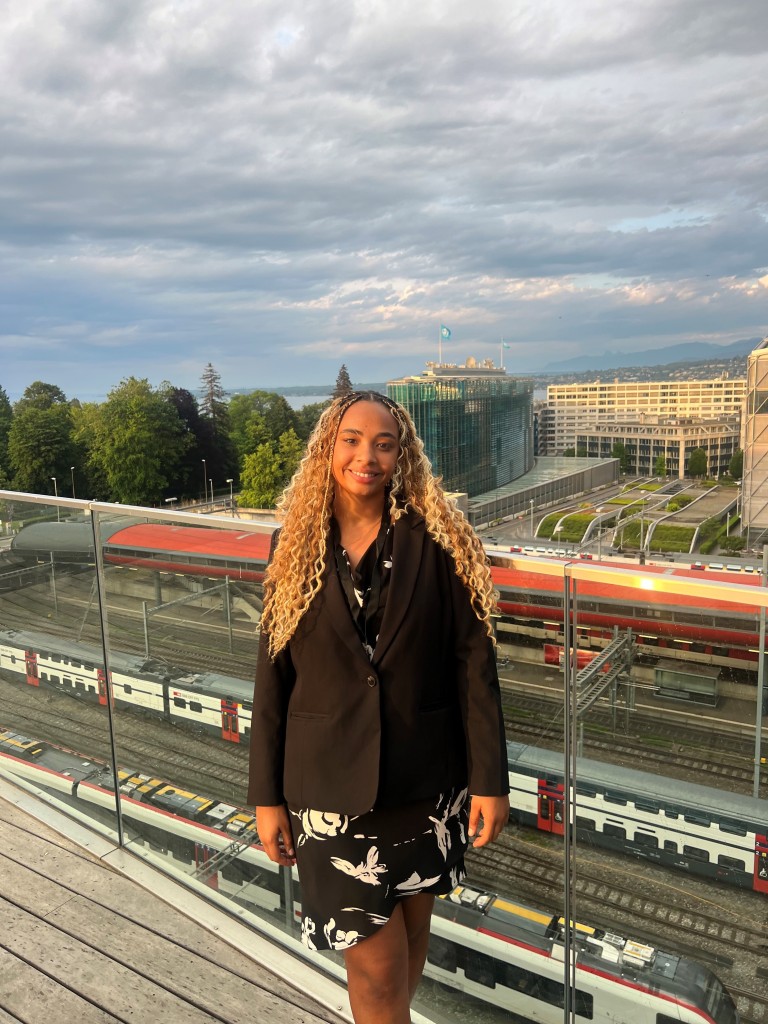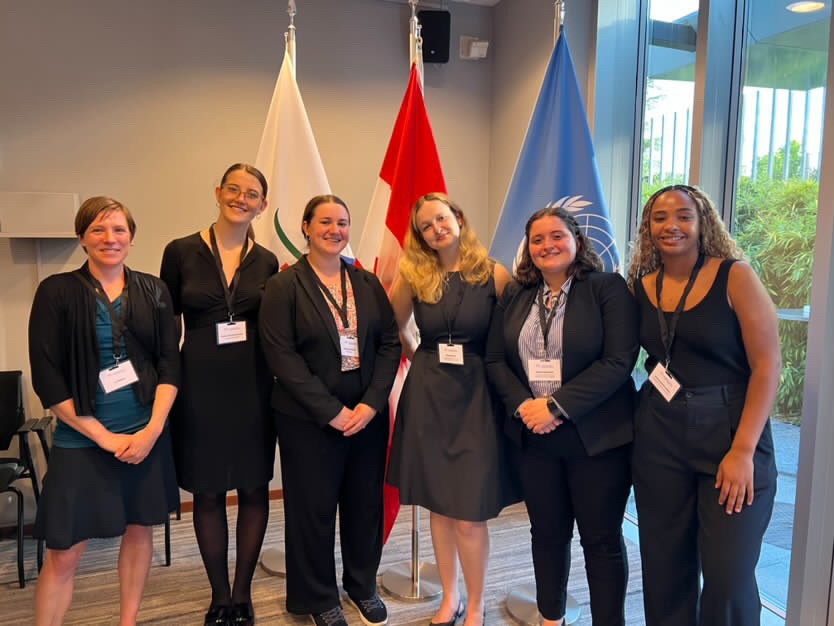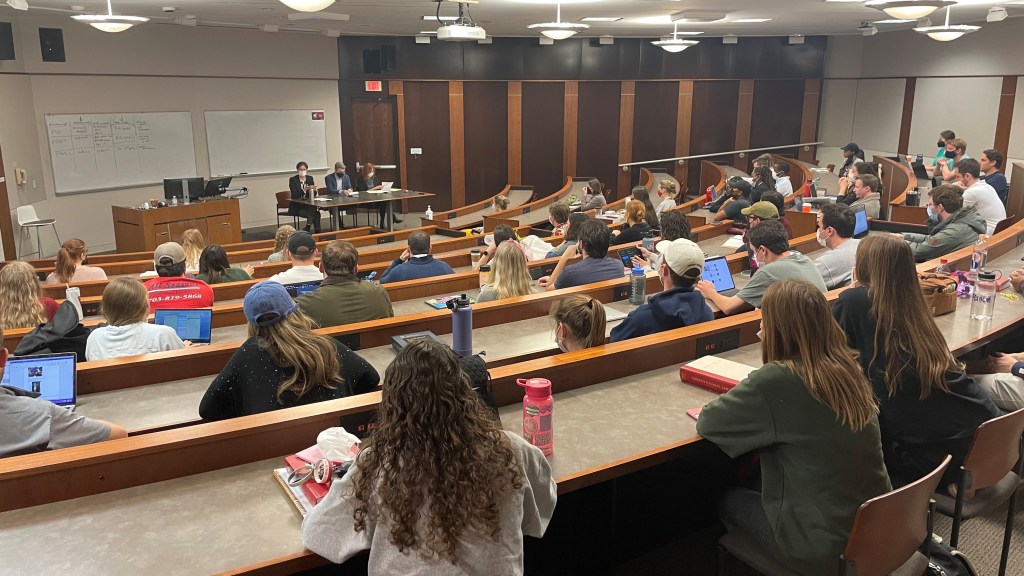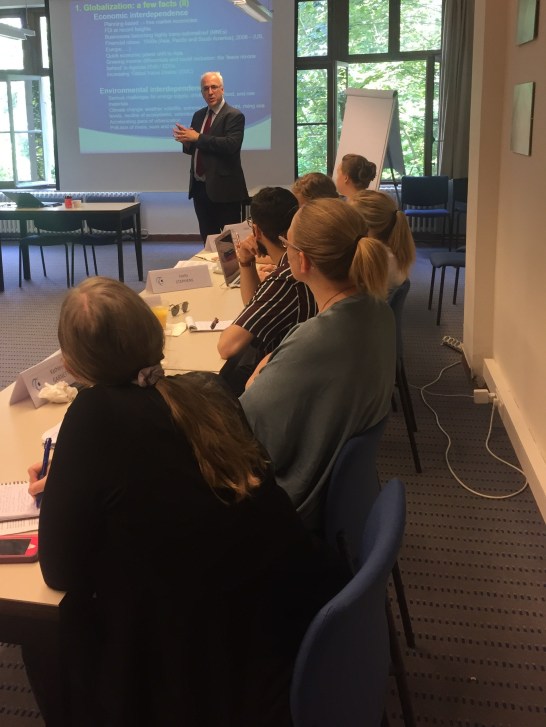
In this item, Miles S. Porter, a J.D. candidate in the University of Georgia School of Law Class of 2021, reflects on his Spring 2020 full-semester externship at NATO HQ SACT in Norfolk, Virginia. Miles’ background includes: B.A. degree in international relations and German, University of South Carolina 2011; U.S. Army active duty 2013-2018, including tour in Afghanistan; and U.S. Army reservist since 2018.
Peace can be brutal. I am reminded of this axiom as an unwelcome silence invades my office space from the street below. The COVID-19 pandemic has brought life to what some have called a “peaceful” and “virtual” standstill. But with an unprecedented 30-plus million Americans claiming unemployment in the last month, “brutal” seems a more appropriate descriptor.
Like many of my peers, I finished my spring semester externship from home, a mere 800 socially distanced miles from my worksite, the NATO headquarters in Norfolk. Early on, I had looked forward to watching the 30th flag raised at Norfolk in honor of North Macedonia’s recent membership, to enjoying the parade of nations at the NATO Festival, and to hearing former NATO Supreme Allied Commander Transformation General James Mattis speak at the Norfolk Forum. Instead I am at home, reflecting.
While America finds itself embroiled in yet another metaphorical war, against COVID, perhaps it is appropriate then that my thoughts have ultimately turned to war itself. Specifically, they have turned to a theory of war that decries the paradox of a “humane war.” This paradox is explored in the 2012 book I read as part of my externship tutorial: Lincoln’s Code: The Laws of War in American History, by Yale Law Professor John Fabian Witt. A compelling narrative about one of the first codifications of the laws of war and perhaps one of the earliest uses of lawfare, Lincoln’s Code is more page-turning adventure story than legal treatise.
The book’s conclusions, far from uncontroversial, initially resonated with me. But they also raised important questions about the role of NATO, the rule of law, and the future of warfare. This post will examine those questions, then end with some thoughts on my NATO experience.
Now to “Old Hundred.”
“Old Hundred”
The U.S. War Department issued General Order No. 100, also known as the Lieber Code, in May 1863, at the height of America’s bloodiest war. Commissioned by President Abraham Lincoln’s Secretary of War, Edwin Stanton, and endorsed by the General-in-Chief of all Union Armies, Henry Halleck—an attorney himself—the “Old Hundred” was a necessary contribution to the Union’s war efforts. First, it helped frame the conflict in legal terms, extending law of war protections to prisoners and proving to foreign states that the Union’s actions were in fact legitimate. Second, it enabled Lincoln to achieve his goal of emancipation.
Lincoln had won the 1860 election on a platform that denounced the expansion of slavery into new states. This precipitated the secession of South Carolina even while James Buchanan was still President, and set the nation on the path to civil war.
The story of The Code is told in tandem with the story of its author, and the maxims within are better read as a story of lessons learned. While Francis Lieber was an academic, a professor first at the University of South Carolina and later at what is now Columbia University, he was also a soldier. He was someone who had his family and his life torn apart by war. His sons fought on opposite sides during the conflict he helped to end. Rather than devote himself to pacifism, however, Lieber thought the call to arms was “the most honorable calling of mankind” and that “when carried on by civilized peoples, just wars were the way civilization spread. … Justice, not peace, [was] the highest ideal.” (Witt 178). Not only did he believe in the importance of just wars, Lieber had kept slaves himself for a time and had seen firsthand the effects of slavery while living in South Carolina. It is in this context that “Old Hundred” should be read.
A notable characteristic of Lieber’s work was that it ran counter to then-conventional doctrine on the laws of war. Lieber openly spoke out against the end of war advocated by the leading contemporary European thinkers (182), preferring the writings of older theorists like Clausewitz. Humanizing wars, in Lieber’s opinion, had the paradoxical effect of prolonging human suffering. He urged short and sharp wars because “the more earnestly and keenly wars are carried on, the better for humanity, for peace and civilization.” (184) This became the basis for the last sentence in Article 29 of his Code:
“Sharp wars are brief.”
The principle at the essence of the Code is military necessity. As Witt shows, military necessity became an almost absolute power, remarkable for what it forbade and more remarkable for what it allowed. Torture was expressly forbidden but the starvation of villages, emancipation of slaves as enemy property, and martial law were permitted, even expected. And yet the principle persisted, so that in the present day military necessity is one of the five accepted principles of the laws of armed conflict, or LOAC.
“Old Hundred” quickly gained traction abroad. European lawyers and politicians had been searching to codify their own “enlightened” laws of war after over a century of bloody conflicts. To this end, they concluded the very first Geneva Convention in 1864. Yet delegates at that Geneva Conference, influenced by some of the more pacifistic thinkers of the day, had gone in a somewhat different direction than Lieber. Their Convention outlawed some of the barbarities of war, reforming war in the hopes of one day ending it altogether. This approach foretold advancements in the laws of war that would occur in the wake of the World Wars of the 20th century.
Choosing an Approach
The Charter of the United Nations was signed and entered into force in 1945. A short five years later, the North Atlantic Treaty, NATO’s founding document, likewise was signed and entered into force. Today, in 2020, Kabul, Afghanistan, has been the site of armed conflict and a nearly two-decades-long military presence by America and its NATO allies. The fact provokes questions:
- Is the “forever war” a byproduct of the humanization of warfare?
- Is that result what Francis Lieber had fought so vehemently against? Or is it merely indicative of the progress made towards the abolishment of warfare as an institution, which the United Nations and its progeny were designed to facilitate?
- By sheathing the short war, have we lost a valuable weapon in our proverbial arsenal, holding ourselves to morals that our less scrupulous foes may not?
These were the questions that I faced after reading Lincoln’s Code.
Initially, I embraced the short, sharp wars advocated by Lieber, Tolstoy, and Clausewitz. Frustrated by a perceived lack of progress in recent war efforts and the absence of defining victories (ignoring a certain shipboard declaration of victory), my inclination was towards a strategy of power, shock, and awe. I thought that .
After further consideration, I think maybe this initial reaction was a bit rash: While I agree with many of the principles and ideals set forth by Lieber and his short-war sympathizers, I believe that he made some key mistakes. Like many who romanticize, he failed to account for the realities of the world.
If we do the same, we do so at our own peril.
Short wars reached their pinnacle with the Cold War. That is ironic since the Cold War was long – nearly a half-century prompted by the threat of the ultimate short war, nuclear war. The international community has since demonstrated a strong aversion to this inhumane form of short war, to the point that in a near-peer conflict it may be more than ill-advised, it may be a nearly impossible strategy to pursue. The changing instrumentalities of war, towards weapons of mass destruction, have altered the calculus of war. As America’s near-peer adversaries retain an interest in a balanced geo-political environment, even short wars with non-nuclear equipped opponents seems unlikely. The new realities of warfare include nuclear weapons, and as long as this remains true, the possibility of short wars will remain distant.
Post-Cold War NATO, or NATO 2.0, represents the other side of this equation. The military alliance, initially established as a After the USSR fell, NATO endured. It participated in some of the largest humanitarian efforts of the 20th and 21st centuries, in places like Kosovo, Haiti, and Afghanistan.
In truth, globalization, the threat of nuclear warfare, and a determined international effort to outlaw war have changed the face of warfare completely. Warfare today is about competition, about living in the gray areas of the law. It resembles humanitarian aid more than it does Gettysburg or Antietam.
Democracy, liberty, and the rule of law are the conquering tools of warfare in the 21st century. They have enabled the alliance to grow to 30 full-fledged members, to conclude official partnerships with 20 Partnership for Peace nations, as well as to develop relationships with numerous other nations from disparate corners of the earth, from Australia to Colombia to Pakistan. The great deterrents in today’s conflicts are not so much weapons as they are the financial costs of waging expeditionary wars and the potential damaging of financial systems. In this environment, communities of peace built on a common foundation are capable of outlasting more powerful foes.
NATO is also capable of holding its own during armed conflicts when they arise. (Another discussion could be had about member nations’ willingness to uphold their article 5 commitment of mutual defense, but that is a separate issue.) NATO retains flexibility in the deployment of its rules of engagement, which allow member nations to pursue their individual national interests while retaining a unity of effort. Effective management of NATO forces requires mastery of this concept by commanders across echelons. Once achieved, it leaves the alliance with plenty of capabilities to accomplish the mission.
Irish poet Robert Lynd once said:
“The belief in the possibility of a short, decisive war appears to be one of the most ancient and dangerous of human delusions.”
The short wars envisioned by Lieber require justice to be the prevailing value in the pursuit of national objectives, and that in turn requires the actors pursuing these objectives to act justly. The limited set of circumstances where this is achievable make his theory complicated enough to make unwise policy. The abuses of the Code’s ideas that took place in subsequent conflicts, like the one in the Philippines at the turn of the 20th century, make this clear. As Witt demonstrated in Lincoln’s Code, the principle of military necessity acted as a cloak that attempted to legitimize abhorrent acts.
Whether organizations like NATO go too far in their pursuit of peace, whether they are influenced too much by groups trying to humanize an inherently inhumane act, strike me as unnecessary questions in today’s environment. Competition will indeed manifest itself as “forever wars.” I find this outcome preferable to the alternative of a persistent nuclear threat.
Final Thoughts
I have found that even dream jobs can begin to show their faults after a few weeks. While NATO certainly suffers from its shortcomings, this job never lost its appeal. In fact, most of what I initially saw as shortcomings eventually appeared to have been deliberate components of NATO’s grand design. The endless hours needed to exhaust every opinion on a topic until consensus is reached certainly can be challenging. The fact that every nation gets a voice at all, however, is truly amazing.
One of my mentors at NATO once told me,
“The beauty of NATO is that it is.”
I hope that despite its challenges in the future, it will always continue to be.










 The group started the day at the International Court of Justice (ICJ) for an audience with
The group started the day at the International Court of Justice (ICJ) for an audience with  In the afternoon, the group visited the International Criminal Court (ICC), located on the dunes near The Hague’s North Sea coast. Student first had a meeting with Prosecutor
In the afternoon, the group visited the International Criminal Court (ICC), located on the dunes near The Hague’s North Sea coast. Student first had a meeting with Prosecutor  The second audience at the ICC was with the
The second audience at the ICC was with the  Students also had the opportunity to view the
Students also had the opportunity to view the  First,
First,  Second,
Second, 
